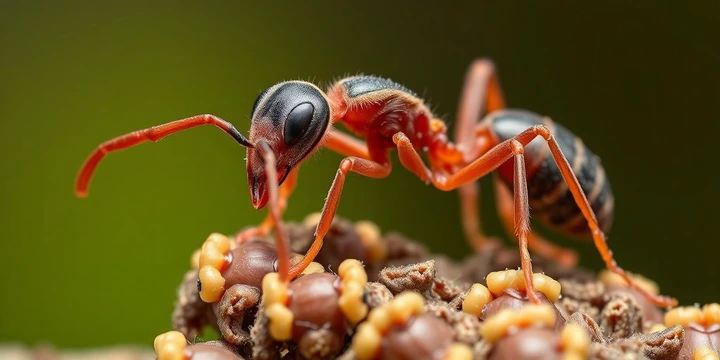
View pictures in App save up to 80% data.
Ants are remarkable creatures that exhibit behaviors often regarded as pre-programmed and instinctual. However, recent research published in Current Biology challenges this long-held notion, unveiling evidence that these tiny insects possess the capacity for experiential learning and memory retention. The study, led by evolutionary biologists from the University of Freiburg, sheds light on ant behavior, particularly their interactions with competitors from neighboring nests. The findings indicate that ants can adjust their responses based on past encounters, demonstrating not only aggression but also a form of memory that influences their social strategies.
The study's experimental framework included exposing ants to competing species from distinct nests, facilitating regulated interactions that examined their behavioral reactions. Throughout these encounters, the ants experienced different levels of aggression from their adversaries. Researchers noted that ants with past experiences involving aggressive rivals were significantly more inclined to react aggressively themselves. This indicates that ants may develop connections between the odors of rival ants and their past experiences, resembling the associative learning processes observed in more complex organisms.
Ants possess a remarkable capability to identify and recall the unique scents of their rivals, which is vital for their social interactions. Every ant colony emits a specific odor, enabling ants to distinguish between their own members and intruders. This ability to recognize scents is instrumental in triggering aggressive reactions, especially towards nearby colonies, which tend to be the main focus of hostility within ant societies. Recent research underscores that an ant's familiarity with the scent of an adversary, particularly one linked to past aggressive interactions, increases the likelihood of initiating aggressive behavior.
Interestingly, the research indicates that aggression varies based on context rather than being a consistent reaction. Ants that faced non-threatening competitors showed markedly reduced aggression when they encountered those same rivals again later on. This finding points to a behavioral hierarchy in which past interactions influence not just immediate reactions but also the ongoing social dynamics between rival colonies. The ability to "bear a grudge" suggests a level of cognitive sophistication that challenges earlier beliefs that insect behavior is purely driven by instinct.
A two-part experimental design was created to explore this intricate behavior. In the initial phase, various groups of ants encountered different scenarios with both known and unknown competitors. Ants that faced off against aggressive rivals showed increased aggression when they later encountered the same opponents. The second phase expanded on this observation by examining the ants' responses to both aggressive and non-aggressive rivals, thereby emphasizing how past experiences shape present behavioral patterns.
A more thorough investigation into the biological and neurological foundations of these behavioral changes is necessary. The researchers proposed that the olfactory receptors in ants might adjust according to their learned experiences, effectively incorporating memories at the level of sensory processing. Gaining this understanding could lead to valuable insights into the connections between olfactory signals and memory and behavior in both insects and more complex organisms.
This study adds to the ongoing discussion surrounding insect cognition, questioning the traditional belief that insect behavior is fixed and unadaptable. It reinforces the idea that animal behavior can exhibit flexibility, paving the way for further exploration into the cognitive abilities of various insect species. The results indicate that ants engage in not only instinctual survival tactics but also in learned social interactions, thereby enhancing our comprehension of ant behavior and their ecological significance.
The findings from this research have far-reaching consequences that go beyond entomology, influencing the study of animal behavior in multiple taxa. As researchers work to unravel the complexities of social dynamics among insects, the discoveries related to ants enrich the growing understanding of cognitive sophistication within the animal kingdom. Subsequent research efforts could build on these revelations to explore how different species modify their behaviors in response to ecological demands and social obstacles.
The research highlights that ants should not be viewed simply as mechanical beings reacting to their environment; rather, they display a level of social intelligence grounded in their ability to learn and remember. This emerging understanding of the cognitive skills of ants calls for a major reevaluation of how both scientists and enthusiasts regard these seemingly simple but complex organisms. The research team is eager to further explore whether the behavioral adaptations seen in ants stem from genetic factors, learned behaviors, or a blend of the two.
Certainly! This thorough research encourages conservationists, evolutionary biologists, and ecologists to reconsider their beliefs about the interactions between different species. Gaining insights into the behavior of ant aggression and their memory could enable stakeholders to develop innovative approaches for preserving biodiversity, especially in ecosystems where these small yet formidable creatures are essential for maintaining equilibrium among diverse species.
The true significance of this research extends beyond its specific results; it opens up a dialogue regarding the essence of intelligence, memory, and learning throughout the animal kingdom. By centering their studies on ants, researchers can delve into broader themes such as the development of social interactions and the mental capabilities of various species, providing scholars with the means to further analyze the complexities of animal behavior.
Research Focus: Aggression and Learning Patterns in Ants.
Article Title: Enhancing Enemy Recognition in Ants Through Associative Learning of Non-Nestmate Signals.
Date of News Release: 2024.
Web References: DOI link.
Citations: M. Bey, R. Endermann, C. Raudies, J. Steinle, V. Nehring: The enhancement of enemy recognition in ants through associative learning of cues from non-nestmates. Current Biology, 2024.
Photo Courtesy: University of Freiburg.
Keywords: Ant behavior, associative learning, memory processes, evolutionary biology, insect intelligence, ant aggression.
Explore additional insights from the world of Science.
Sign up to receive the newest posts directly in your inbox.